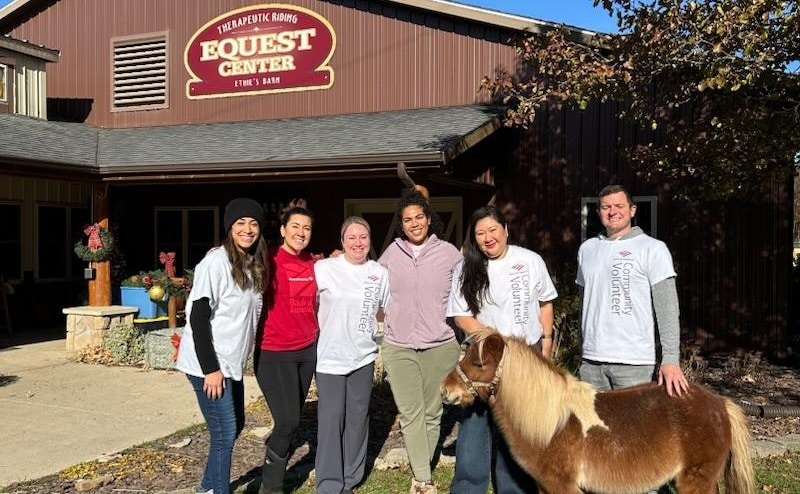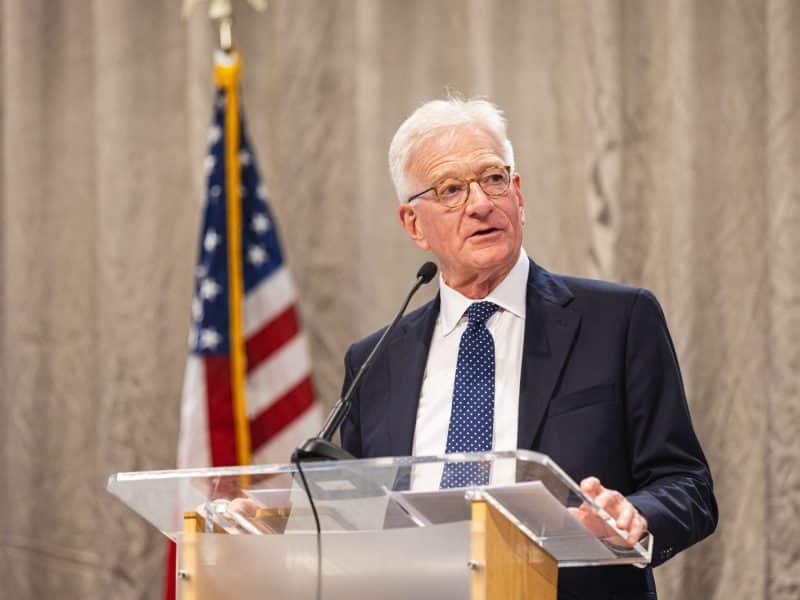Making it in GR: More diversity in tech means starting with education
As the tech industry grows in Grand Rapids, the tech talent pool needs to grow too. Adding more talent to the pool means getting educational opportunities to new communities and creating more diverse tech culture.
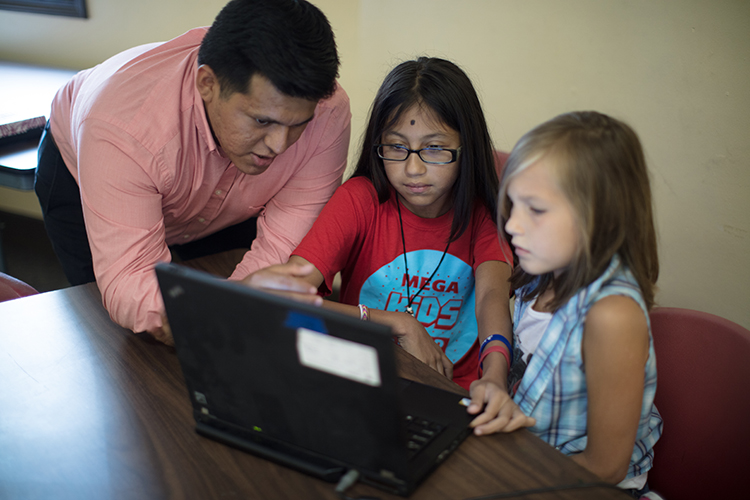
Grand Rapids has a lot going for it in terms of growth and technology. According to numbers published by The Right Place, West Michigan’s IT industry is one of the fastest growing in the nation, boasting a growth rate of 18.5%, 6.5% above the national average. In such a promising industry, in such a rapidly growing city, Kelsey Perdue, Program Manager at Grand Circus in Grand Rapids, believes “The (tech) industry should look like the community we live in.” But it doesn’t.
According to Perdue, while the overall workforce is made up of 60% women, in the IT industry it’s only 25%. And while the number of women in computing jobs peaked in 1991, (according to a 2016 study) it’s been on a steady decline ever since. Grand Rapids was also ranked one of the worst cities in the country for African Americans and there is only 53% employment within the African American communities.
While these numbers are discouraging, they also create potential. Combine the rapid growth of the tech industry and the low employment numbers for women and minorities and there’s a potential to create change. To truly create that change, tech training needs to be available to everyone regardless of sex, race, neighborhood or economic status. These are some of the groups in Grand Rapids working to make that happen.
Inspired to change
Jonathan Jelks, co-founder of the Midwest Tech Project, says, “Tech is the most exciting, high-growth industry…and it’s one that can address some economic disparities.”
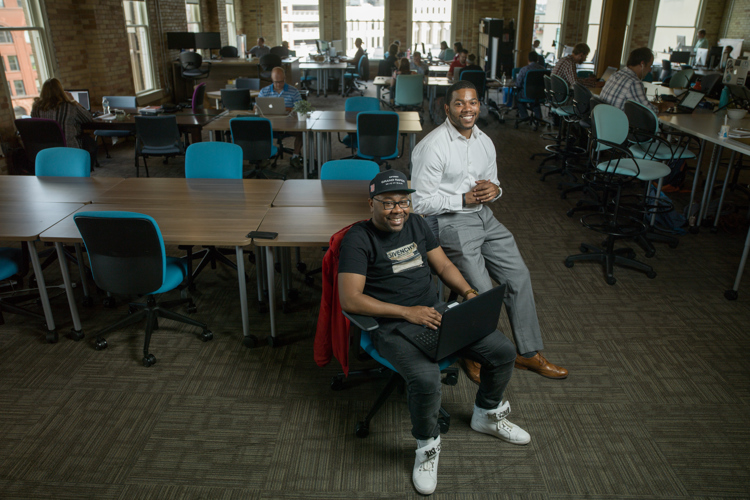
To address the gap in these numbers and utilize the potential for change, Grand Circus offers a number of solutions that they hope will help the tech industry mirror the Grand Rapids community. Their DEVELOP(her) coding bootcamp, taking place September 12th to November 17th, was established to address the numbers above. To make sure that the program is widely available, 12 women will receive full scholarships funded by various sponsors. One of those sponsors, TEKsystems, chose to fund the scholarships because they saw the value in not only exposing more women to tech training but also in building the tech talent pool.
“Women in IT are underrepresented,” says Jon Carpenter, Director of Business Operations, “and it’s been hard for companies to find tech talent. Between those two problems, we see this as a great vehicle to get women and minorities in the field and increase the overall population of IT professionals in West Michigan.”
While growth within the tech industry is a good thing for Grand Rapids, it has created a shortage of talent. “West Michigan has grown so much,” says Perdue, “there are companies that are hiring, but there is a limited labor force.” Building the talent pool here means companies won’t need to go to other markets to fill jobs. “We’ve got people that have an interest in moving into those careers (from others),” says Perdue, “they just need to be retrained.”
For Jonathan Jelks, growing up in Grand Rapids and witnessing the poverty that plagues African American communities, it seemed natural for him to focus his energies on workforce development and connecting minorities to the high growth careers that can feed their families. While Grand Circus focuses on adults looking to change careers, The Midwest Tech Project is integrating the kids who have never considered entering the tech industry. He says the students in his programs don’t get involved for two reasons, “They think it’s not for them, and they don’t know how to take advantage of the opportunities out there.”
Starting early
Luis Perez, one of the founders of Loop Coding Center (LCC), knows from experience why students could feel the industry wasn’t meant for them. When he took a coding class in college, he was the only Latino student along with only one female. “It was uncomfortable,” he says. “They all knew more than me and they didn’t look like me.” He came into the class with a lack of experience compared to his classmates and this, combined with feeling out of place, led him to believe the industry wasn’t for him. This feeling was what spurred him to create a company centered around teaching coding to Latinos and African American students. Now, Loop Coding Center, a newly founded startup focused on teaching computer programming to kids in 6th-12th grade, hopes to get out into the community and leverage partnerships with nonprofits to offer coding classes to those that may not normally have access. Right now, Perez is teaching classes through Roosevelt Park Ministries but LCC will soon host classes in various non-profits throughout the city.

Jelks and Perez are both using their programs to address the reasons kids don’t get into tech by changing the way technology is taught. “Tech isn’t discussed in a way that makes it practical,” Jelks says. “If there is any genius in what we’re doing, it’s demystifying tech and the different paths they can take to be a part of the industry. There are opportunities besides coding or developing.”
That’s why both MWTP and Grand Circus move beyond simply teaching coding and focus on career development, connection, and the soft skills that will help build careers, not just skills.
“Some of them want to be designers,” says Jelks, “so we connect with design companies and ask them to partner with us.” They just have a lack of exposure, he adds, “but…it’s easy to connect young, bright people with people doing that work in the tech industry.”
Changing the landscape
Jelks and Perez both agree that exposure to these careers needs to begin at a young age but demands just aren’t being met. “Grand Rapids Public Schools are trying,” says Perez, “But they don’t have the resources.” He also adds that when they do teach coding, they use games and the kids tend to view it as play time. “They aren’t teaching what coding is, or how they can use it in the future. We need to get them to understand how they can use it outside of school, because everything revolves around coding.”
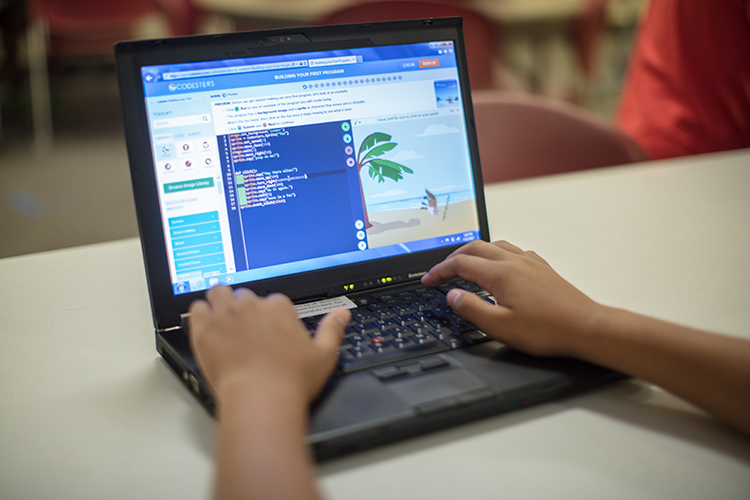
There’s also a reluctance to embrace the shift in the economy which can be witnessed even in the students within these programs. “It really surprised us,” says Perez about one of his female students, “that she was worried about technology taking away jobs from her family. They work in factories and she says their jobs are being taken away by machines.”
Jelks adds that this attitude is what is holding a lot of people back. “Our families worked in factories but those jobs are never coming back and neither are the days when my grandfather was able to raise a family of 5 off that income.”
In all industries, technology is taking over and Perez says the students need to be prepared. “She needs to be ready,” he says referring to the previously mentioned student, “to do the coding that powers the machines she is talking about.”
They also need to be ready soon. And, they need to be ready to not only enter these jobs, but excel at them, move up, and take on leadership positions. The intense training programs offered by Grand Circus are designed to help those that want to transition from one career into the tech industry, and they cover all bases, not only providing coding lessons but also the soft skills participants will need to be successful in whatever business they enter. In 2-3 months, students are trained in a coding language and ready to enter the tech workforce. And because the field, as it stands, can often be an uncomfortable place for women (the quit rate for women in tech is more than twice as high for women as it is for men) Grand Circus is working to ease the transition by pairing women entering the industry with the women already working there. Through the Ignite Program hosted by their partner Michigan Council of Women in Technology Foundation, they hope to cut back on the number of women leaving the industry by providing a welcoming smile, a resource, and a guide as they transition.

All three of these entities are looking to not only teach coding, but create a culture of technology in Grand Rapids. This means not only providing classes in schools and making those classes accessible to all, but also providing the training that will keep participants focused and help them succeed.
“The kids we work with just need someone next to them, coaching them,” says Perez. “For many of them, it’s their first experience coding.” They all offer the personalized training that online courses can’t and the speed college degrees can’t. They also offer the practical skills and attitudes students will need to succeed in the workforce and the attitude needed to help West Michigan create an even stronger, more diverse tech industry.
“Making It In Grand Rapids” is a series about local entrepreneurs and the issues that matter in building a sustainable startup-friendly community. Read more in the series here. Support for this series is provided by Start Garden. You can reach the editor of this series, Allison Spooner, on Twitter or e-mail her at alspooner@gmail.com for story tips and feedback.
Photography by Adam Bird, Bird + Bird Studio.

